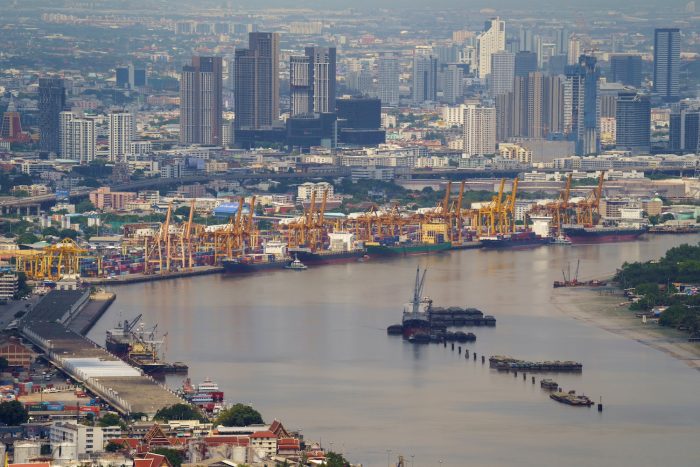The Thai government has sought to downplay downgrades of the country’s economic outlook this week by Moody’s, and the central bank, based on the threat posed to its exports from US tariffs.
A government spokesman said on Wednesday that Moody’s had “jumped the gun” by revising Thailand’s outlook from stable to negative – and not waiting for the country to begin trade talks with Washington, which has threatened to impose a 36% tariff on Thai goods sent to the US.
“Thailand and other countries around the world are still in the negotiation process, and there are no clear results yet,” spokesman Jirayu Houngsub said in a statement.
ALSO SEE: US Has Reached Out to Discuss Tariffs, China’s State Media Says
Later, at a dinner talk on Wednesday evening, Prime Minister Paetongtarn Shinawatra noted that Thailand suffered a downgrade in 2008 but eventually recovered its ‘stable’ rating.
She said her government has made preparations to cope with increased tariffs on Thai exports to the US. And it had taken steps to improve the economy through increased investment in future industries and gain more foreign investment in technology, such as data centres.
Paetongtarn, the daughter of former PM Thaksin, said Thailand’s growth rate for the last quarter of 2024 rose to 3.2%, from 2.5% throughout most of last year.
Trade talks planned
She gave an assurance that her government would do its utmost to negotiate directly with the Trump administration, to get a deal through ASEAN, the Southeast Asian regional bloc, that will have the least impact on the country.
Meanwhile, Kobsak Pootrakool, a senior executive vice-president at Bangkok Bank, said in a Facebook post the revised outlook by Moody’s was primarily based on concerns that the nation’s economic and fiscal strength could deteriorate further, in light of US trade and tariff policies.
Tariffs imposed by President Trump pose an economic risk to many countries in Asia and are a major threat to Thailand’s economy, which relies heavily on exports.
Late on Tuesday, Moody’s affirmed the Thai sovereign rating at an investment-grade Baa1 due to strong monetary institutions and affordable access to debt.
But the ratings agency reduced its forecast for Thailand’s GDP growth from 2.9% earlier this year to about 2%.
Central bank rate cut
Also on Wednesday, the Bank of Thailand (BOT) cut its key interest rate by a quarter point for a second consecutive meeting.
That move was aimed at supporting the currently underperforming economy, which was shaken by a major earthquake in Myanmar on March 28.
The quake caused a multi-storey building under construction in Bangkok to collapse, a drama that killed 66 workers and left another 28 still missing. That tragedy hit tourist arrivals in the lead-up to the popular Songkran Thai New Year festival in mid-April.
Officials on the BOT’s Monetary Policy Committee voted 5-2 to reduce the one-day repurchase rate by 25 basis points to 1.75%, the lowest level in two years. That followed a similar cut at its last meeting in February.
In a statement released after Wednesday’s meeting, the central bank said: “The Thai economy is projected to expand at a slower pace than anticipated, with more downside risks due to uncertainty in major economies’ trade policies and a decline in the number of tourists.
“Headline inflation remains subdued and is expected to decline below the target range due mainly to supply-side factors.”
It said the economy would grow by 2% at best this year, down from an earlier forecast of 2.5%.
- Jim Pollard
ALSO SEE:
China ‘Compiling a List of US Goods Exempt From Its 125% Tariffs’
US Says One of its First Trade Deals Will be With India
China Warns CK Hutchison, BlackRock: Be Careful on Ports Deal
China Says US Tariffs Severely Affect Its Airlines and Boeing
Tariffs Must be Scrapped if US Truly Wants a Trade Fix: China
Chinese Builder Linked to Bangkok Tower Collapse Under Scrutiny
Carmakers Shares Tumble After Trump Announces 25% Auto Tariff
Thousands in Limbo as Thailand Fights Scam Hubs on Two Fronts
























